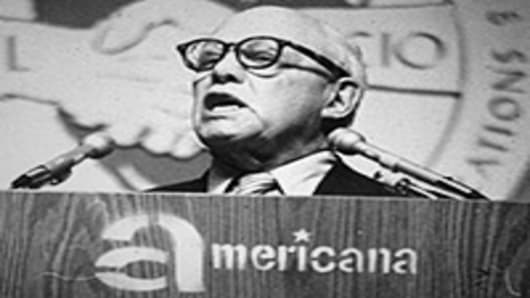It first showed up in the mainstream in 1971. George Meany, the firebrand labor leader and famed president of the AFL-CIO, was reacting to Richard Nixon’s “New Economic Policy,” which called for wage and price controls to tame inflation, as well as lifting some excise taxes to stimulate spending. Meany called the plan “Robin Hood in Reverse, robbing the poor to pay the rich.”
(Whether the plan worked is debatable.)
The cry showed up again in 1981 — amidst another recession. This time Albert Shanker, president of the American Federation of Teachers, called Ronald Reagan’s cuts to social-welfare programs “Robin Hood in reverse.”
He told the press: ''The money is going to come from those who have the least, and it's going to those who have the most.”
The Reagan years, in fact, saw the phrase used repeatedly, with many on the left claiming Reagan’s 1981 tax reform was reverse Robin Hood-ism.
Reverend Jesse Jackson made the phrase a key part of his run for president in 1984, saying that Reagan’s economic policies were “Robin Hood in reverse.” Jackson usually added that the true measure of national character is “how we treat the least among us.''
In the early 1990s, when Democrats were raging against inequality, Rep. David R. Obey (D-Wis.) said, “In the 1980s, we had a Robin-Hood in reverse tax policy of taking money from working families and giving it to the richest Americans.”
The phrase also has also popped up among the country-club set. In 1985, a controversy over the location for the Bing Crosby Clambake, a pro-am golf tournament, caused Bing’s widow to complain that, since the charity tournament had been taken over by highly-paid pros, less of the proceeds were going to charity.
“It’s like Robin Hood in reverse,” she told reporters.
When the St. Petersberg Yacht Club in Florida wanted to expand to include more public waterfront, residents cried “Robin Hood in reverse” in the local papers.
The phrase was even been used on Wall Street. A plan in 1987 for the Midwest Stock Exchange to move assignments to larger trading firms was called “Robin Hood in reverse” by the smaller trading firms, since it was “taking from the weak to give to the strong.”
Britain, the original home of Robin Hood, has also participated. Labor party leaders attacked Prime Minister Margaret Thatcher’s tax plan as “Robin Hood in reverse.”
Bill Clinton was accused of reverse Robin Hooding when he proposed means testing for Medicare. Democrats attacked George W. Bush’s first $1.6 trillion tax cuts as “Robin Hood in Reverse.” They said the same in response to the second round.
Congressman Bernie Sanders, the colorful, left-leaning independent from Vermont, has often wielded the phrase against Obama. Obama’s compromises with Republicans on taxes, he has said, “are taking from the middle class and working families, and we are giving it to the wealthiest people in this country."
From the right, Grover Norquist has also accused Obama of reverse Robin Hooding. Last year, he wrote in USA Today that Obama’s spending has created an overclass of highly paid federal workers while private sector workers were struggling.
“Obama is Robin Hood in reverse,” he wrote.
In sum, the phrase has been used by all sides as an over-simplification of policy — a fairy-tale formulation that makes it easy even for a child to know that it’s “wrong,” even if the details are more complicated and fuzzy.
Now, it seems, it’s Obama’s turn.
-By CNBC's Robert Frank
Follow Robert Frank on Twitter: @robtfrank



